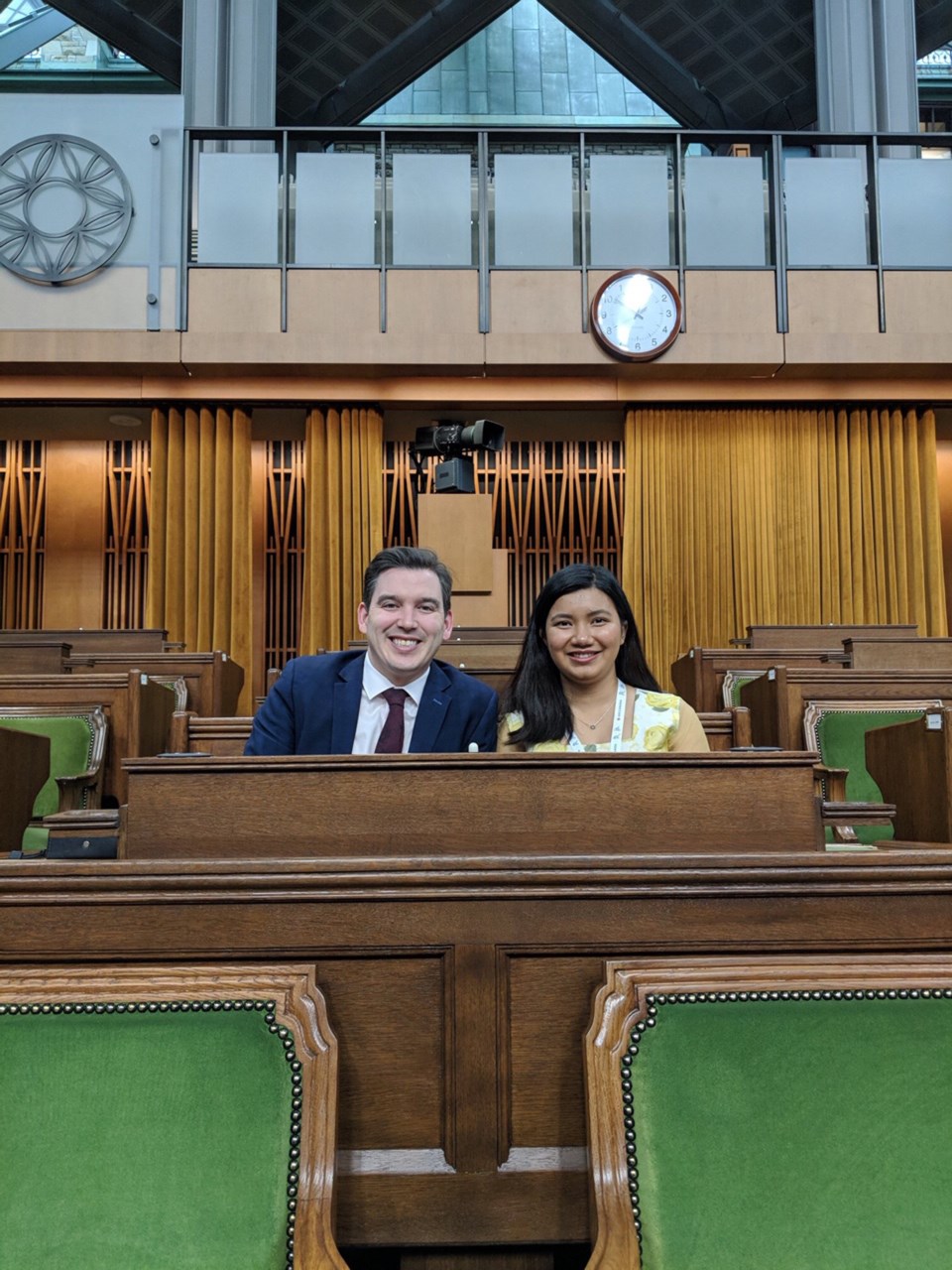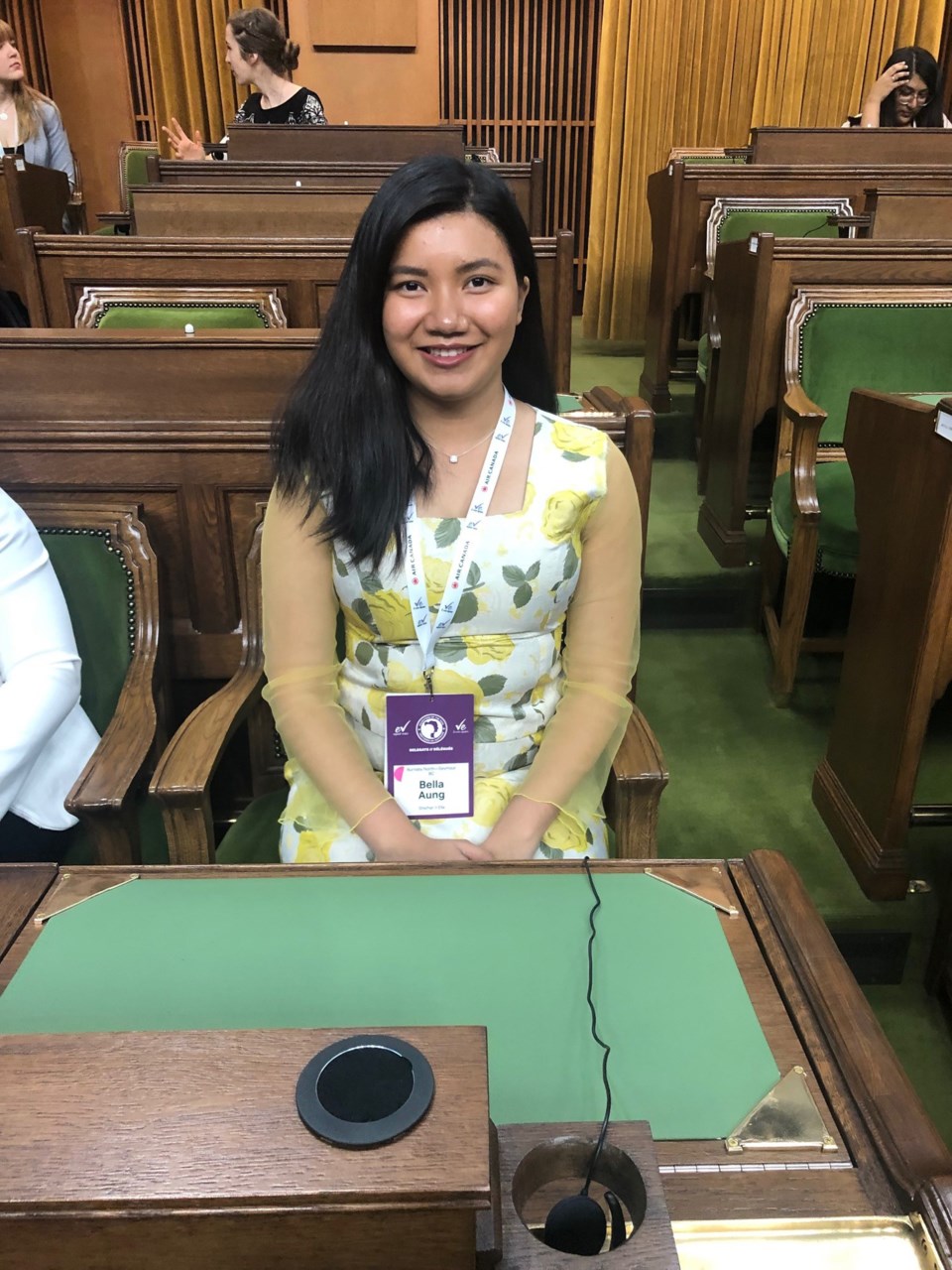It was an act of silent protest that Bella Aung isn’t likely to forget: the moment when she turned her back on Prime Minister Justin Trudeau in the House of Commons.
Aung was the Burnaby North-Seymour delegate to this year’s Daughters of the Vote, an event that brings 338 young women – one for each federal riding – to Ottawa to get a closer look at the inner workings of Canada’s political system. The first event was held in 2017, marking the 100th anniversary of women’s right to vote in federal elections.
This year, the second in what’s planned as a biannual event, found the young women at the centre of a national media storm after two protests on April 3: one when a group of delegates turned their back on Trudeau; the other when a group walked out on Conservative Party Leader Andrew Scheer.
Aung, 23, had the chance to sit in Liberal MP Terry Beech’s seat for the occasion.
For the record: yes, she did turn her back on Trudeau, and no, she didn’t walk out on Scheer.
The delegates’ response to Trudeau was generally interpreted as a protest of his handling of the SNC-Lavalin affair and the decision to kick Vancouver-Granville MP Jody Wilson-Raybould and Markham-Stouffville MP Jane Philpott out of the Liberal caucus.
But Aung said Trudeau’s “mistakes” on the SNC-Lavalin file weren’t her motivator. Rather, it was his handling of questions by the delegates that eventually provoked her to get to her feet and turn her back.
“When people started asking him questions, that’s when I started getting frustrated,” she said. “He wasn’t answering any questions directly, especially about Indigenous communities. … He wasn’t giving anything tangible. It was all words to me, all fluff.”
It was the words of Hannah Martin, an Indigenous delegate from Nova Scotia, that convinced Aung to turn her back on Trudeau. Martin took the prime minister to task for his government’s “oppression” of her people, the Mi’kmaq, and told Trudeau that he couldn’t call himself a feminist if he allows corporations to rape the land.
“That’s when I stood up,” Aung said. “If you only care about a certain type of woman and don’t acknowledge the existence of another type of woman, you cannot be a feminist.”
And, no, Trudeau didn’t call on Aung to ask a question; if he had, she was ready to ask about the Trans Mountain pipeline expansion project and how he could justify the potential risk to the safety of Burnaby Mountain (where, she points out, thousands of young women are studying at Simon Fraser University – so if Trudeau is truly interested in the fate of young Canadian women, shouldn’t he be concerned about their safety?).
As far as Scheer was concerned, Aung had a simple reason for not walking out.
“I do not know his politics enough to protest him,” she said.
She pointed out that Scheer at least acknowledged the fact that protesters were walking out on him, but Trudeau did not – and she’s been disappointed in Trudeau’s lack of commentary about the event since.
“We wonder, didn’t our message get through to you?” Aung said. “I do not dislike him as a person; I was just disappointed.”

What also bothered Aung was the fact that, after the delegates’ session in the House of Commons, some MPs approached the young women and “scolded” them for disrespecting Trudeau and Scheer.
“It makes me very concerned about my initial impression of Canada,” Aung said, noting she always believed Canada was a place where it was safe to engage in peaceful protest, so being taken to task for doing so didn’t sit well with her.
The Myanmar-born Aung was raised in the U.S. and moved to Canada in 2017 to pursue her master’s degree in political science at Simon Fraser University.
Aung notes her life has been shaped by both her own existence as a visible minority and her family background as Indigenous people in Myanmar (her grandparents were part of the Mon and Karen people). The Indigenous experience in Myanmar – where the Indigenous population has been “double colonized” by the Burmese and the British, and where Indigenous languages have been disappearing in part because people were forced to attend Burmese-language schools – has strong parallels to that in Canada.
“Before I came to Canada, I did not know about Indigenous people at all,” she said. She was shocked to discover the reality of some of the living conditions on reservation land in Canada are “about the same living standards as the villages in Myanmar. It’s very disheartening.”
Aung said she felt privileged to be welcomed into Indigenous spaces during the Daughters of the Vote event – which, along with the House of Commons session, included a chance to attend Question Period and visit the Senate, plus take part in two days of workshops.
She noted that many of the Indigenous delegates and women of colour who were part of the event had a particularly difficult time during the week when social media turned ugly. In one instance, a Facebook page called Say No to Jagmeet Singh took aim at a group of Muslim delegates, using photos of the young women in their headscarves to illustrate that they’re not “real” Canadians.
“This experience was traumatizing, especially for the very marginalized populations,” Aung said, adding she hopes that in future years there can be better debriefing for delegates after some of the highly political sessions. “Being in a very political space can have different impacts on different types of women. I know my Indigenous sisters and my black sisters, they were more traumatized.”
Aung was also disappointed in those MPs who didn’t make themselves available to the Daughters of the Vote delegates from their own riding.
Her own experience with Beech, she said, was highly positive. He took the time to meet with her, to be there to show her around and to introduce her to other elected officials – including Minister of Science Kirsty Duncan, whose passion for women in STEM and women in politics resonated with Aung.
Beech also acknowledged Aung in a statement in the House of Commons.
“Terry is a very nice person,” Aung said. “His policies, in general, are not bad. I am a lot more radically left-wing than he is.”
Since returning from Ottawa, Aung has also had a chance to meet with former New Democrat MP Svend Robinson, who’s hoping to claim Burnaby North-Seymour for the NDP come this fall’s federal election.
“A lot of his policies I agree on,” Aung said, noting she questioned him on some of her key issues - including mental health, the pipeline and support for the LGBTQ community. “I was satisfied with his answers.”
Aung has been invited to help on Robinson’s campaign when it picks up steam later in the spring. She’s already offered the veteran politician – who’s returning to politics after a 15-year absence – some advice about becoming more social-media-savvy (who, she wonders, can run for office without an Instagram account?) and reaching out more actively to younger voters. She’d like to see Robinson at SFU working with the NDP club there in an attempt to get out the student vote.
“This riding is very vanilla, very neutral,” she said, but the presence of the university could help to disrupt the status quo – if someone can get the young voters to the polls. “There’s a lot of young voters in this riding, too, who are not politically involved. There’s not much mobilization in this riding.”
Though Aung says federal NDP Leader Jagmeet Singh is her favourite of the federal leaders, she says Canada’s electoral system won’t allow him to become prime minister.
“I think Canada is not ready for a brown man with a turban, and an NDP leader,” she said, noting the country is likely to simply keep swinging back and forth between Liberal and Conservative governments. “Jagmeet is the leader we want, but we cannot just vote him in. … Canada needs a different type of electoral system, so we do not have to vote strategically for the lesser of two evils.”
For the coming federal election, Aung has a message for fellow young voters.
“I would just like to tell the young people of this riding to be more involved … and make sure they voice what they want from their representative,” she said. “If we don’t step out of our comfort zone and tell them what’s going on, they won’t know. … Your voice matters, and if you can mobilize, even better.”
And she has some hope for the election outcome in Burnaby North-Seymour, where she respects both Beech and Robinson.
“Both Svend and Terry actually took the time to talk to me. They were both very gracious, so I felt very lucky,” she said, adding she feels that will carry over to their work as MP, should one or the other be elected. “At least they will listen. I can not promise they would do everything we want them to do, but at least they will listen.”
WHAT IS DAUGHTERS OF THE VOTE?
It’s organized by Equal Voice, a bilingual, multi-partisan organization that, since 2001, has been advocating for the equal representation of women in Parliament, in provincial and territorial legislatures and on municipal and band councils.
Its goal is to have emerging young women leaders become familiar with Canada’s political institutions “so that they are equipped and inspired to participate in the formal political sphere.”
The 2019 event was designed to help Equal Voice continue its efforts to bring more diverse young women into formal political spaces. It included a chance for the delegates to sit in the House of Commons and participate in a public session, as well as hearing from federal leaders. It also offered skills training and workshops, including an Indigenous forum.
“The journey of women's full political participation, in all of their diversity, is far from complete. Daughters of the Vote is an important step in closing the gap,” says the website.
Burnaby had three representatives for the 2019 event: Bella Aung for Burnaby North-Seymour; Georgina Johnston for Burnaby South; and Dolma Tsundu for New Westminster-Burnaby.
- Source: www.daughtersofthevote.ca



